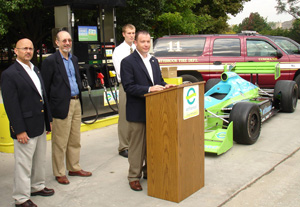 Rural school districts in Kansas are receiving small wind turbines as part of the National Renewable Energy Laboratory’s Wind for Schools Initiative. The Kansas City Wind for Schools Program and the Wind Applications Center at Kansas State University have selected several schools in Kansas’ Concordia School District to receive a Skystream 3.7 wind turbine.
Rural school districts in Kansas are receiving small wind turbines as part of the National Renewable Energy Laboratory’s Wind for Schools Initiative. The Kansas City Wind for Schools Program and the Wind Applications Center at Kansas State University have selected several schools in Kansas’ Concordia School District to receive a Skystream 3.7 wind turbine.
The small, 1.8 kilowatt turbines will become part of the curriculum at the schools. This is the first round of the three-year program; if all goes as planned, the program will place five turbines each year for the next two years at more schools.
The rural schools or districts selected to receive the initial turbines include the Concordia School District, USD 333, Cloud County; Walton Rural Life Charter Elementary School, Newton School District, USD 373, Harvey County; Fairfield High School, USD 310, Reno County; Sterling School District, USD 376, Rice County; and Ell-Saline School District, USD 307, Saline County.
In addition to the turbines, the Kansas Wind Applications Center will install an anemometer tower and instrumentation at the Southeast Kansas Educational Service Center in Greenbush, which is near Girard in Crawford County, said Miller, associate professor of electrical and computer engineering at K-State. An anemometer measures the force or speed of wind.
The program aims to train young engineers for jobs in the rapidly growing wind industry, and to increase public awareness and understanding of wind power.
Schools receiving the turbines are expected to incorporate education about wind energy into their science curricula, including how turbines work and how to collect, process and understand the data the turbines will provide.


 Denmark-based Hendricks Industries says it will build a $32 million plant in Keokuk, Iowa… the fifth wind turbine equipment maker to locate in the state that is also becoming a leader in wind energy production.
Denmark-based Hendricks Industries says it will build a $32 million plant in Keokuk, Iowa… the fifth wind turbine equipment maker to locate in the state that is also becoming a leader in wind energy production. Surprise, surprise… petroleum giant Texas has cut some of the state’s incentives to biofuels makers.
Surprise, surprise… petroleum giant Texas has cut some of the state’s incentives to biofuels makers.  Rep. David Swinford, a Republican lawmaker from West Texas who wrote the original legislation, said Texas was betting the state’s future on “a depleting entity” by ignoring alternative fuels.
Rep. David Swinford, a Republican lawmaker from West Texas who wrote the original legislation, said Texas was betting the state’s future on “a depleting entity” by ignoring alternative fuels. The U.S.’s first wholly-owned canola biodiesel plant has opened near Velva, North Dakota. The ADM plant is right next to ADM’s crushing facility and will produce 85 million gallons of biodiesel when it’s fully operational.
The U.S.’s first wholly-owned canola biodiesel plant has opened near Velva, North Dakota. The ADM plant is right next to ADM’s crushing facility and will produce 85 million gallons of biodiesel when it’s fully operational. “This is an exciting time for North Dakota,” said Sen. Kent Conrad, D-N.D. “Our state has the potential to serve as the nation’s powerhouse. North Dakota’s vast resources can be used to reduce our nation’s dependence on foreign oil, control energy prices and grow our state’s economy. This plant in Velva is leading the way.”
“This is an exciting time for North Dakota,” said Sen. Kent Conrad, D-N.D. “Our state has the potential to serve as the nation’s powerhouse. North Dakota’s vast resources can be used to reduce our nation’s dependence on foreign oil, control energy prices and grow our state’s economy. This plant in Velva is leading the way.” The plant will use the equivalent of 600,000 acres of the state’s canola crop… a fact not lost on North Dakota’s Governor John Hoeven:
The plant will use the equivalent of 600,000 acres of the state’s canola crop… a fact not lost on North Dakota’s Governor John Hoeven: Kansas flex-fuel motorists can take advantage of bargain prices while pumping up the local economy at an E85 grand opening in Manhattan, Kansas on Friday. E85 will be available for $1.85 a gallon at the
Kansas flex-fuel motorists can take advantage of bargain prices while pumping up the local economy at an E85 grand opening in Manhattan, Kansas on Friday. E85 will be available for $1.85 a gallon at the  Next week, on Tuesday, Kum & Go, the
Next week, on Tuesday, Kum & Go, the  “This event is meant to celebrate ethanol use in Iowa and to ramp up excitement for ISU’s homecoming week,” said Jerry Main, a corn grower and chairman of the Usage and Production Committee at Iowa Corn. “This event marks a great set of anniversaries: Iowa State is celebrating 150 years and Iowa Corn has been promoting ethanol for 30 years. I am also glad to see the partnership between Iowa Corn and Kum & Go benefiting Iowa consumers.”
“This event is meant to celebrate ethanol use in Iowa and to ramp up excitement for ISU’s homecoming week,” said Jerry Main, a corn grower and chairman of the Usage and Production Committee at Iowa Corn. “This event marks a great set of anniversaries: Iowa State is celebrating 150 years and Iowa Corn has been promoting ethanol for 30 years. I am also glad to see the partnership between Iowa Corn and Kum & Go benefiting Iowa consumers.” “Switching to the new labels is voluntary but it enables fuel retailers to capitalize on growing consumer awareness and the national brand-building activities that are being spearheaded by EPIC,” said White. “More and more consumers are seeking out ethanol-enriched fuel and this branding program will help consumers find it simply by looking for the brand image that will be consistent from pump to pump and from city to city across Illinois — and, eventually, across the entire United States.”
“Switching to the new labels is voluntary but it enables fuel retailers to capitalize on growing consumer awareness and the national brand-building activities that are being spearheaded by EPIC,” said White. “More and more consumers are seeking out ethanol-enriched fuel and this branding program will help consumers find it simply by looking for the brand image that will be consistent from pump to pump and from city to city across Illinois — and, eventually, across the entire United States.” A
A 

 U.S. Senator Charles Grassley (R-IA) was among those attending a a grand opening and open house this week at Magellan Midstream Partners’ biodiesel blending facility in Mason City, Iowa.
U.S. Senator Charles Grassley (R-IA) was among those attending a a grand opening and open house this week at Magellan Midstream Partners’ biodiesel blending facility in Mason City, Iowa. “This is a perfect example of cooperation between energy companies — of companies working arm in arm instead of in competition with one another to solve a problem,” said Grassley.
“This is a perfect example of cooperation between energy companies — of companies working arm in arm instead of in competition with one another to solve a problem,” said Grassley. Gusts of energy from
Gusts of energy from